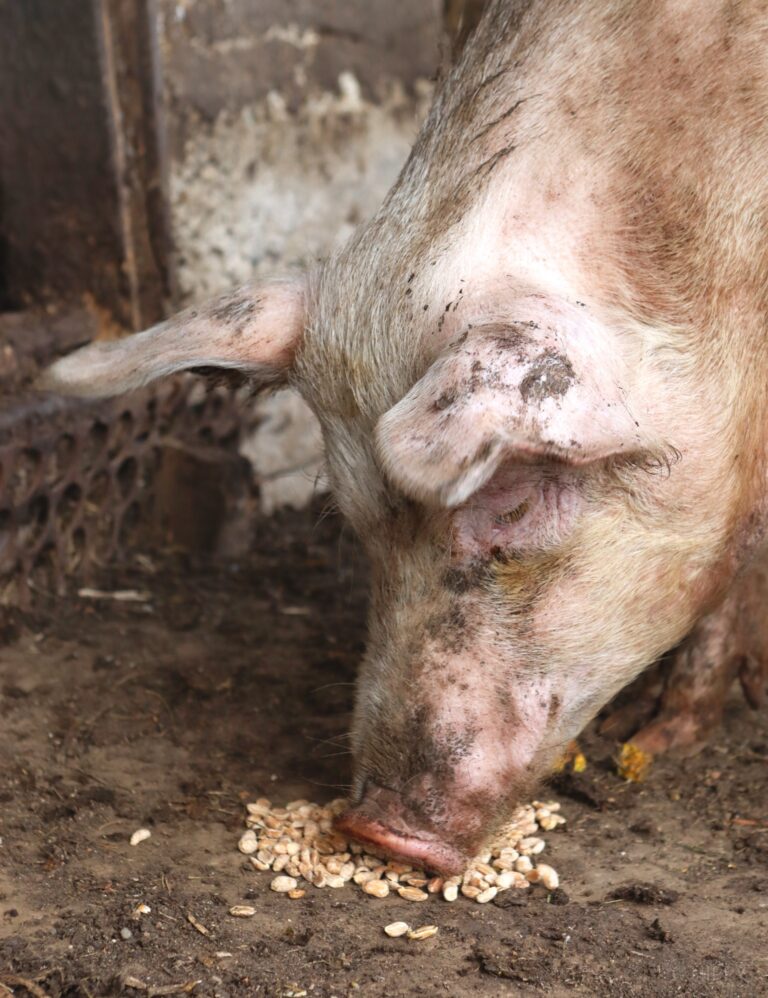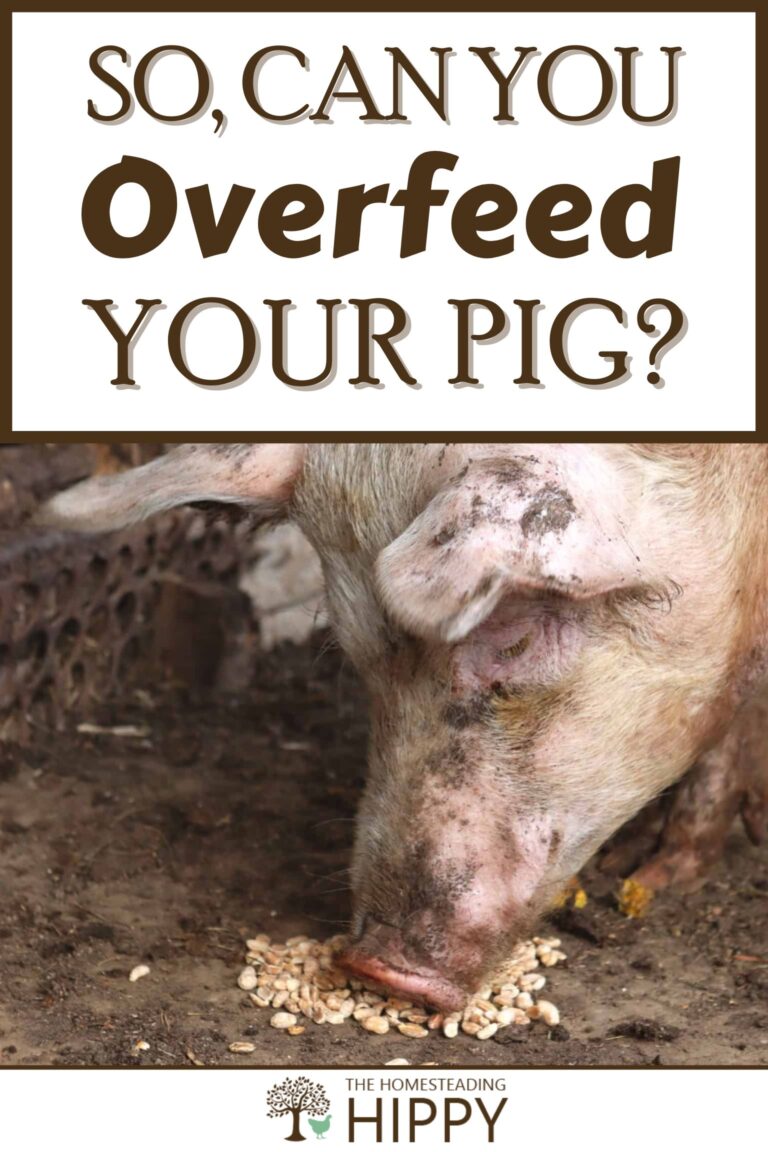I think by now everyone knows that pigs love to eat. Like, really love to eat! And that’s a good thing, too, since most keepers who are raising pigs for meat have a vested interest in fattening them up.

Finishing weight is everything when it comes time to slaughter, so we need our happy herd to pack in the calories.
But have you ever stopped to wonder if it is possible for a pig to eat way, way too much? Can you actually overfeed a pig?
Yes, it is possible to overfeed a pig. Overfeeding pigs that are not intended for quick slaughter can cause a number of problems, including joint and heart problems, and difficulty breathing.
In fact, even feeder pigs will start to gain too much fat instead of muscle.
Turns out, pigs aren’t too good at showing restraint when eating, especially when fed high-calorie foods regularly.
You might not have anything to worry about if your pig gains a few too many pounds, but being chronically overweight or obese is not going to help them thrive or help your bottom line. We will tell you more on this subject below.
Can Pigs Really Overeat?
Yes, pigs can overeat. In the wild, pigs are foragers and their diet is based on what they can root up.
This means that they will eat as much as possible when food is available, storing calories as body fat to use during lean times.
Of course, most domestic pigs are not going to experience any real famine conditions assuming their owners care and there isn’t some extreme shortage of food.
They are in fact more likely to be overfed by well-meaning but inexperienced owners who think that more food must always be better. After all, pigs are supposed to fatten up, right?
Pigs love food, and especially love delicious high-calorie foods like table scraps, sugar, corn, and so forth. This means that they are likely to gorge themselves if given the opportunity, which can lead to problems.
But we need to give our pigs plenty of calories, either to promote good weight gain so we can maximize the meat we get upon slaughter, or to make sure breeding pigs and sows have plenty of energy for mating and resources for raising young.
What’s the difference between ensuring they have plenty of food and overfeeding?
What Does Overfeeding Mean, Exactly?
Overfeeding is when you give pigs more calories than they need for their current stage in life based on your objectives.
For example, a breeder sow who is not currently nursing piglets does not need as many calories as she would if she were actively lactating.
An immature piglet doesn’t need as many calories as a full-grown finishing hog.
A finishing hog being fattened for slaughter will need more calories than a pig that is not yet ready for butchering.
However, even a finishing hog can be overfed if they are given too many calories and put on too much fat too quickly.
What are the Consequences of Overfeeding Pigs?
The consequences of overfeeding pigs vary depending on the age and stage of life of the pig, but can include joint problems, heart problems, difficulty breathing, and even death.
Piglets that are overfed are more likely to become and stay overweight or obese as adults. This isn’t just a case of being a little flabby; these pigs will be often significantly larger than their peers and may have trouble walking or moving around due to their size.
Overweight and obese pigs are also more likely to suffer from joint problems later in life. This is because their extra weight puts added strain on their legs, hips, and other joints which can lead to arthritis or other degenerative joint diseases.
Another consequence of overfeeding pigs is heart problems. Fat tissue around the heart can make it difficult for the organ to pump blood effectively, leading to congestive heart failure.
Pigs that are overweight or obese are also more likely to suffer from high blood pressure (hypertension), which further increases the risk of heart problems.
Pigs that are chronically overeating may also have difficulty breathing due to the extra fat tissue around their chest and neck.
How to Avoid Overfeeding Your Pig.
Avoiding overfeeding is not difficult, but it does require some knowledge about pigs and their nutritional needs.
The first step is to learn and understand what your pigs need at different stages of their life.
After that, you must provide the right amounts of the right foods for your pigs based on their stage of life and your objectives.
This means that you should avoid giving them excess high-calorie foods unless you are specifically trying to fatten them up for slaughter. A little treat doesn’t hurt, but a regular diet of junk foods is bad- even for pigs!
You should also avoid giving them large amounts of grain or other healthy but concentrated sources of calories unless they are actively working or growing.
What Should You Do if you Think Your Pig is Overfed?
If you think your pig is overfed, the best thing to do is to talk to your veterinarian or a livestock nutritionist.
They will be able to help you determine if your pig is actually overweight or obese, and if so, develop a plan to help them slim down safely. This may include changing or throttling their diet, increasing their activity level, or both.
What is the Right Amount of Food for a Pig?
Pigs are like other animals in that they can’t just be fed once a day and left to fend for themselves.
On the other hand, compared to most livestock pigs do need a more or less steady supply of food so they put on as much muscle as quickly as possible, but not so much that they start packing on too much fat.
A good rule of thumb is to give your pigs access to decent but lower-calorie food at all times or higher-calorie fare on a limited basis but at least three times per day. This will help them stay healthy while putting on weight in a manageable way.
If you are feeding your pigs commercial feed, it should contain nearly all the nutrients they need to grow and thrive.
You can supplement their diet with fresh meat, fruits, grains, and vegetables, but make sure that these items are always given in accordance with their dietary needs and feed plan.
And as always, make sure your pigs have access to clean water. A pig can drink up to 8 liters of water per day, so make sure their trough is always full.

Tom has built and remodeled homes, generated his own electricity, grown his own food and more, all in quest of remaining as independent of society as possible. Now he shares his experiences and hard-earned lessons with readers around the country.
Find out more about the team here.
